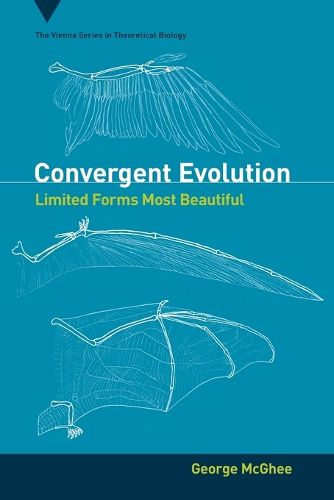Readings Newsletter
Become a Readings Member to make your shopping experience even easier.
Sign in or sign up for free!
You’re not far away from qualifying for FREE standard shipping within Australia
You’ve qualified for FREE standard shipping within Australia
The cart is loading…






This title is printed to order. This book may have been self-published. If so, we cannot guarantee the quality of the content. In the main most books will have gone through the editing process however some may not. We therefore suggest that you be aware of this before ordering this book. If in doubt check either the author or publisher’s details as we are unable to accept any returns unless they are faulty. Please contact us if you have any questions.
An analysis of convergent evolution from molecules to ecosystems, demonstrating the limited number of evolutionary pathways available to life.
Charles Darwin famously concluded On the Origin of Species with a vision of endless forms most beautiful continually evolving. More than 150 years later many evolutionary biologists see not endless forms but the same, or very similar, forms evolving repeatedly in many independent species lineages. A porpoise’s fishlike fins, for example, are not inherited from fish ancestors but are independently derived convergent traits. In this book, George McGhee describes the ubiquity of the phenomenon of convergent evolution and connects it directly to the concept of evolutionary constraint-the idea that the number of evolutionary pathways available to life are not endless, but quite limited.
Convergent evolution occurs on all levels, from tiny organic molecules to entire ecosystems of species. McGhee demonstrates its ubiquity in animals, both herbivore and carnivore; in plants; in ecosystems; in molecules, including DNA, proteins, and enzymes; and even in minds, describing problem-solving behavior and group behavior as the products of convergence. For each species example, he provides an abbreviated list of the major nodes in its phylogenetic classification, allowing the reader to see the evolutionary relationship of a group of species that have independently evolved a similar trait by convergent evolution. McGhee analyzes the role of functional and developmental constraints in producing convergent evolution, and considers the scientific and philosophical implications of convergent evolution for the predictability of the evolutionary process.
$9.00 standard shipping within Australia
FREE standard shipping within Australia for orders over $100.00
Express & International shipping calculated at checkout
Stock availability can be subject to change without notice. We recommend calling the shop or contacting our online team to check availability of low stock items. Please see our Shopping Online page for more details.
This title is printed to order. This book may have been self-published. If so, we cannot guarantee the quality of the content. In the main most books will have gone through the editing process however some may not. We therefore suggest that you be aware of this before ordering this book. If in doubt check either the author or publisher’s details as we are unable to accept any returns unless they are faulty. Please contact us if you have any questions.
An analysis of convergent evolution from molecules to ecosystems, demonstrating the limited number of evolutionary pathways available to life.
Charles Darwin famously concluded On the Origin of Species with a vision of endless forms most beautiful continually evolving. More than 150 years later many evolutionary biologists see not endless forms but the same, or very similar, forms evolving repeatedly in many independent species lineages. A porpoise’s fishlike fins, for example, are not inherited from fish ancestors but are independently derived convergent traits. In this book, George McGhee describes the ubiquity of the phenomenon of convergent evolution and connects it directly to the concept of evolutionary constraint-the idea that the number of evolutionary pathways available to life are not endless, but quite limited.
Convergent evolution occurs on all levels, from tiny organic molecules to entire ecosystems of species. McGhee demonstrates its ubiquity in animals, both herbivore and carnivore; in plants; in ecosystems; in molecules, including DNA, proteins, and enzymes; and even in minds, describing problem-solving behavior and group behavior as the products of convergence. For each species example, he provides an abbreviated list of the major nodes in its phylogenetic classification, allowing the reader to see the evolutionary relationship of a group of species that have independently evolved a similar trait by convergent evolution. McGhee analyzes the role of functional and developmental constraints in producing convergent evolution, and considers the scientific and philosophical implications of convergent evolution for the predictability of the evolutionary process.